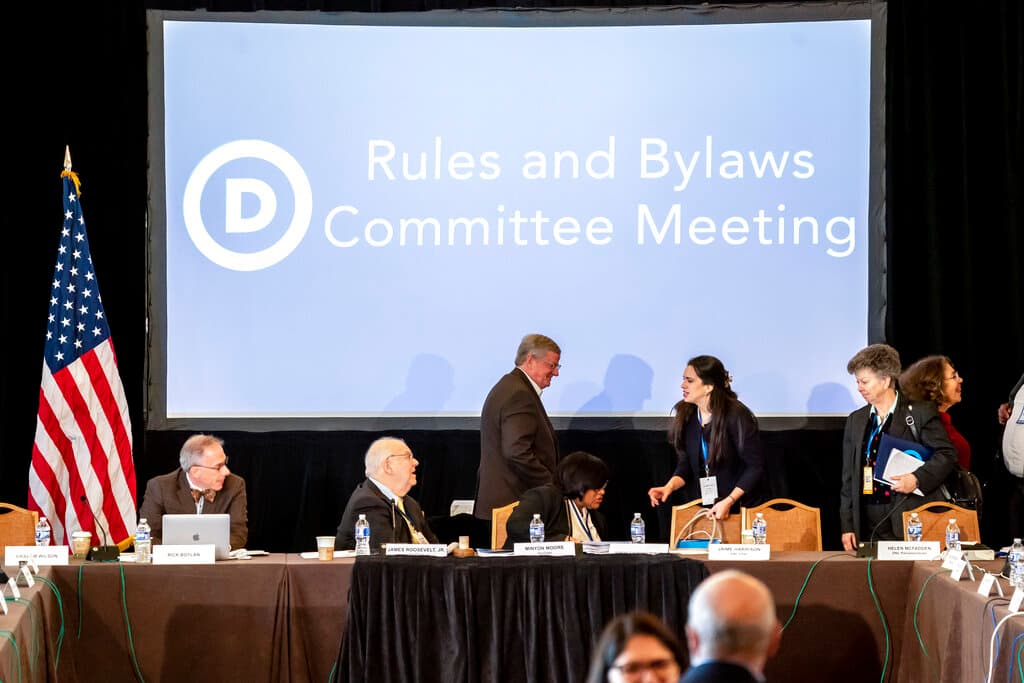New Hampshire May Have a New Motto: Vote First or Die
State Democratic leaders are scrambling to hold on to first-in-the-nation presidential primary status with the DNC moving toward big changes for 2024.

Democratic leaders in New Hampshire, the state that has held the first-in-the-nation presidential primary for more than 100 years, are scrambling to hold on to that status after the Democratic National Committee approved a plan to radically reorder the party’s presidential nominating calendar for 2024. The DNC now wants to make South Carolina the first primary contest and to scrap Iowa entirely from the early window.
Under the plan, New Hampshire and Nevada would now vote on the same day following the South Carolina primary, with Georgia and Michigan next. This was announced as President Biden’s preferred primary schedule during a dinner at Washington for members of the party’s Rules and Bylaws Committee. The group has been meeting since March to discuss a shakeup to the schedule, with a focus on increasing diversity in the early window.
Thursday was the first time Mr. Biden publicly weighed in on the issue. “For decades, Black voters in particular have been the backbone of the Democratic Party but have been pushed to the back of the early primary process,” he wrote in a letter to the Rules and Bylaws Committee. “We must ensure that voters of color have a voice in choosing our nominee much earlier in the process and throughout the entire early window.”
For more than 50 years, the Iowa caucus and New Hampshire primary have kicked off the presidential nominating process; the populations of both states are more than 90 percent white. In 2008, two states with more diverse populations, South Carolina and Nevada, were added to the early window before Super Tuesday.
Mr. Biden failed to win Iowa or New Hampshire in 2020, departing the Granite State before voting day to help solidify his decisive win in South Carolina, a state with a large African American population that helped him clinch the nomination. The idea of moving South Carolina to the top of the calendar is likely at least partially a reward for the role the state played in his win.
The DNC plan has Iowa losing its top slot in 2024 after a disastrous 2020 caucus that featured technological and communication errors, which caused a days-long wait to learn results. The state is also overwhelmingly white and has been increasingly leaning Republican, and the Democratic National Committee is pushing to move away from caucuses, which are seen as exclusionary to certain groups like hourly workers, since they require showing up at a specific time.
In his letter, President Biden was blunt: “Our party should no longer allow caucuses as part of our nominating process.”
Moving the New Hampshire primary would be more complicated. State law requires the presidential primary be held “on a Tuesday selected by the secretary of state which is seven days or more immediately preceding the date on which any other state shall hold a similar election.” The law shows just how seriously the Granite State takes its first-in-the-nation primary status, and Democratic officials there are not rolling over without a fight.
“The DNC did not give us our first-in-the-nation primary, and it is not theirs to take away,” the New Hampshire Democratic Party chairman, Raymond Buckley, tells the Sun. “The law is the law, and we are going to uphold it.”
In a statement released Thursday night, Mr. Buckley reiterated the state’s commitment to holding the first primary no matter the consequences, which could mean losing delegates: “This news is obviously disappointing, but we will be holding our primary first. We have survived past attempts over the decades and we will survive this.”
A Rules and Bylaws Committee member, Mo Elleithee, expressed frustration at the New Hampshire law during the group’s July meeting, foreshadowing the proposed changes. “I don’t like that the committee is held hostage by that,” he said. “I am less inclined to stand on tradition, or on what any individual state laws might or might not say. We need to do what is right for us.”
The committee was expected to vote on proposed calendar changes in August but delayed it until after the midterms — a move widely seen at the time as an attempt to help Senator Hassan win re-election in a tight race.
“I strongly oppose the President’s deeply misguided proposal for changes to the primary calendar. Make no mistake, New Hampshire’s law is clear and our primary will continue to be First in the Nation,” Ms. Hassan tweeted.
Before Thursday night’s announcement, Nevada was seen as the top contender for replacing Iowa and New Hampshire at the top. With a population of just more than 3 million, of which nearly 30 percent are Latinos, 9 percent Black, and 8 percent Asian, Nevada pitched itself as a racially diverse alternative to New Hampshire. Both are battleground states and have small enough populations for effective retail politics without requiring large-dollar media buys. Nevada also changed its caucus to a primary after the 2020 election.
The addition of two large states, Georgia and Michigan, with their substantial delegates up for grabs, could spell the end — or at least a reduction — to the amount of state fairs, diner meet-and-greets, and one-on-one talks with voters that have come to define the early campaign window. It could also mean that candidates with money will focus on Georgia and Michigan, dwarfing the importance of the other early window states and making relatively unknown candidates have a harder time breaking through the pack.
“In NH, it doesn’t matter how much money you have, where you come from or who knows your name — in our primary, everyone has a fair shot,” New Hampshire’s senior senator, Jeanne Shaheen, a Democrat, tweeted. “As frustrating as this decision is, it holds no bearing on when we choose our primary date.”
Following the Rules and Bylaws Committee vote, the full Democratic National Committee will vote on the proposal in late January or early February.
Mr. Biden has expressed his intention to run for re-election in 2024, and this calendar may just reflect his preferences. In his letter to the committee, Mr. Biden wrote that members “should review the calendar every four years, to ensure that it continues to reflect the values and diversity of our party and our country.”
The Republican National Committee has already committed to upholding the Iowa, New Hampshire, South Carolina, and Nevada calendar, so the two parties’ primary schedules could deviate in the coming election cycle.
New Hampshire’s governor, Chris Sununu, a Republican and possible contender for the GOP presidential nomination in 2024, gave this warning to the Sun: “Republicans are sticking with New Hampshire as first-in-the-nation, and Democrats in New Hampshire must continue to press their case with Washington party-bosses — otherwise New Hampshire voters will not forget.”

